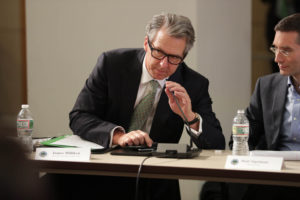This post was updated Jun 10 at 2:00 p.m.
James Milliken is no stranger to leading a university.
Milliken, who has worked in higher education since 1988, previously led the University of Nebraska, the City University of New York and the University of Texas systems. But he will soon take on an unprecedented challenge – running the nation’s leading public university system as it faces budgetary struggles and a greater national reckoning on the value of funding higher education.
The UC Board of Regents appointed Milliken – known to his colleagues and friends as “J.B.” – to be the University’s next president beginning Aug. 1. Milliken will succeed current UC President Michael Drake, who led the University through the height of the COVID-19 pandemic, pro-Palestine protests and various budgetary challenges.
[Related: James Milliken appointed by UC Board of Regents as next University president]
Milliken will inherit a series of issues that emerged in the final months of Drake’s tenure – including a systemwide hiring freeze, potential cuts to National Institutes of Health grants, slashed funding from the state and the looming threat of a federal administration committed to revoking federal funding from universities that fail to meet its demands.
“We’re facing unprecedented times in higher education for many reasons, and I think we all recognize what they are, in terms of funding from the federal government,” Milliken said at a May UC Regents meeting announcing his appointment. “We need to continue to advance the University in every way we can.”
The Trump administration has withheld federal grants and contracts from several universities for allegedly allowing antisemitism on their campuses. It also withheld funding from the University of Pennsylvania for permitting a transgender female athlete to compete on its women’s swim team.
Leo Terrell, the head of a Trump-created antisemitism task force, said in a Fox News interview that the UC should expect discrimination lawsuits – and for the federal government to “go after them where it hurts financially.”
[Related: Federal official claims Trump administration intends to sue UC for discrimination]
But Bret Anthony Johnston, the director of the Michener Center for Writers at the University of Texas at Austin, said he suspects Milliken may have taken on the role because of – rather than in spite of – these challenges.
“He may have felt drawn to the UC system because of that opportunity to make the kind of difference that he’s made at Texas,” he said. “He is someone who wants to leave the institutions that host him in a far better place.”
Jeff Raikes, the former CEO of the Gates Foundation, said Milliken’s upbringing influenced his desire to work in public service. Raikes, who grew up on a Nebraska farm around 30 minutes from Milliken’s hometown, added that Milliken’s town raised him on honesty, integrity and the importance of giving back to his community.
“You learn that your community is a huge part of your own success, and that you have a responsibility to take your own success and engage in the community,” he said.
Milliken received his bachelor’s degree from his state’s flagship university – the University of Nebraska-Lincoln – in 1979. Milliken later earned his J.D. from New York University, where he was a Root-Tilden-Kern scholar – a prestigious program that covers full tuition for students who vow to pursue public service.
Susan Poser, the former dean of the NU College of Law, said the scholarship was an early reflection of Milliken’s commitment to the public good.
“It’s the public interest scholarship – so that gives you a sense that he’s very publicly minded,” said Poser, the current president of Hofstra University. “Those things tie together.”
Following a stint practicing law on Wall Street, Milliken began his career in higher education in 1988 as the executive assistant to the NU president. He later became NU’s vice president for external affairs and secretary to its Board of Regents before leaving his home state to serve as the senior vice president of the University of North Carolina system in 1998.
Milliken took on his first leading role for a university in 2004, when he became the president of the NU system.
During his tenure, Milliken expanded tuition support for low-income students and acquired funding for three systemwide institutes. One of those programs was the Daugherty Water for Food Global Institute, which Milliken secured a $50 million gift for, said Roberto Lenton, the institute’s founding executive director.
Lenton added that Milliken established relationships with the United States Agency for International Development and the United Nations Food and Agriculture Organization. Milliken’s passion for the institute never faded after its opening, Lenton said, adding that he traveled to conferences in Washington, D.C., Stockholm and Rome to garner support for it.
“That was part of what really sold the institute to me, because he really believed in it,” Lenton said. “He went out of his way to communicate that passion.”
Lenton said Milliken worked well with farmers and the private sector to ensure the institute ran smoothly – and added that Milliken thoughtfully considered the role that external stakeholders play in running a university.
Milliken increased access to higher education for disadvantaged students in Nebraska through the Collegebound Nebraska program, Poser said, which provided free tuition for students whose family income was below $50,000.
“The Collegebound program is a perfect example of how he thinks about education,” Poser said.
Raikes said Milliken carried that commitment to accessibility throughout his tenure at other institutions – including by creating the Accelerated Study in Associate Programs at the City University of New York, which he left NU for in 2014.
ASAP provides academic and financial support to CUNY students, which are some of the country’s lowest-income. ASAP had a three-year graduation rate of 53% as of April 2024, which is more than double the rate of a comparison group that was not enrolled in the program.
Milliken also oversaw the establishment of the CUNY School of Medicine, which focuses on serving marginalized communities.
“If you look at his career trajectory, he clearly understands what public higher education should deliver, especially for students and families and especially those who have been historically excluded or underserved,” Raikes said.
Ann Kirschner, the former dean of CUNY’s Macaulay Honors College, said Milliken asked her to join him in the Central Office after she stepped down as dean – a choice she said she never would have made on her own.
There, the two collaborated on projects, including an initiative to encourage female students to pursue computer science. The program, Kirschner said, expanded nationwide after receiving the support of investors, including Melinda French Gates.
“Mr. Milliken was my stalwart partner in helping to develop that and get it up and running,” Kirschner said. “We were both tickled when it went way beyond just CUNY into a national program.”
CUNY came under fire in November 2016 following the release of a New York Inspector General report which called the system “ripe for abuse” and alleged that individual college presidents used university-issued funds to provide executive staff members with personal benefits.
The report centered on “questionable activities” that occurred before Milliken’s tenure. However, it mentioned that Milliken allowed the President of CUNY’s Queens College to receive a supplemental salary of $40,000 through the Queens College Foundation – funding that was not listed in the president’s offer letter nor approved by the CUNY Board.
Milliken announced he would step down a year later, citing a battle with throat cancer and turnover within the Board of Trustees.
“CUNY is an extraordinary university, and my time here has been rewarding beyond measure,” he said in a letter to the CUNY community. “The world now knows, from groundbreaking research on an unprecedented scale, that CUNY is the greatest engine of social and economic mobility in the country.”
Less than three months after Milliken left CUNY, the UT Board of Regents announced that he was the sole finalist in its search for the next chancellor of the UT system. A spokesperson for the UT system confirmed that Milliken had a “clean bill of health,” and Milliken began the role in September 2018.
While at UT, Milliken piloted a program that gave free tuition to families earning less than $100,000. He also set record enrollment numbers, with over 256,000 students attending the University’s 14 institutions as of fall 2024.
Jacqueline Fay, the former chair of the UT faculty advisory council, said Milliken made a point to attend every council meeting. She added that she appreciated how Milliken allowed faculty to ask him questions without preparation.
“It was really a session for any member of that council to ask any question that they had, after all, to the chancellor,” Fay said. “It’s rare for leaders to allow for that type of spontaneous questioning and answering.”
Fay added that the chancellor was particularly fixated on restoring the public’s perception of higher education, which he often spoke about with the council.
Johnston said the chancellor gave his creative writing graduate program “extraordinary” attention, and added that his program was not anomalous in receiving that support from Milliken. His desire to listen – rather than speak – allowed Milliken to make decisions that turned the UT community into a better version of itself, Johnston added.
“I’ve always been struck by how he listens far more than he speaks, and he only speaks when he feels as though he has something to add,” Johnston said. “That’s when you realize what a brilliant mind you’re in the presence of.”
Jochen Reiser, the president of the UT Medical Branch, said Milliken let UT’s hospitals retain their autonomy, understanding that he could trust leaders with medical experience.
Reiser added that Milliken was highly invested in the success of all parts of the UTMB system, regardless of the size of the institution. Milliken frequently boasted on Reiser’s behalf after a UT medical center located in Laredo – a town on the Texas-Mexico border that is over 95% Hispanic or Latino – gave out its first doctoral degree under Reiser’s leadership, he said.
“He has talked so much about it,” Reiser said. “He has highlighted it as part of my major accomplishments, when we had so many other obvious successes and big financial successes.”
Reiser added that Milliken worked well with the Texas legislature, but said he believes Milliken’s choice to move to a university system in California was made with politics in mind.
In May 2024, Milliken said in front of a Texas senate committee hearing that UT had eliminated a systemwide total of 311 jobs and 21 offices to comply with Senate Bill 17 – the state’s Republican-led ban on diversity, equity and inclusion programs in public universities and colleges.
Several leading universities – including the University of Michigan and the University of Southern California – have ended DEI initiatives on their campuses following federal directives to eliminate such programs. While no individual UC campus has closed its office dedicated to diversity, the University announced it would eliminate diversity statements in its hiring processes March 19.
[Related: UC announces elimination of diversity statements in hiring processes]
Milliken will be tasked with running six of the nation’s leading health systems as UC president. But Reiser said Milliken is prepared to take on – and will not become complacent in – this role.
“Part of the reason he was chosen, in my mind, is because he is this very experienced leader, but he’s also a man of action,” Reiser said. “He is somebody who is tireless – and I think he will argue for higher education, access to education, financial support for scholarships and research at any given time.”
Milliken officially stepped down from UT on May 30. In less than two months, he will enter the role of UC president with a laundry list of obstacles.
But Kirschner said she believes Milliken will see these challenges as an opportunity, rather than a setback.
“If you’re the right kind of leader, you say to yourself, ‘Wow, what a time of challenges. What an extraordinary moment to make a difference,’” she said. “That’s what I expect he will do.”





Comments are closed.